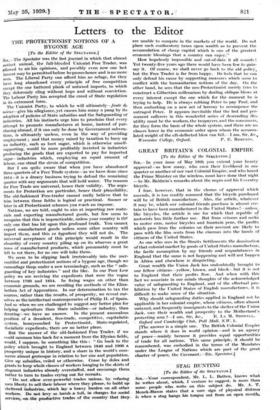GREAT BRITAIN'S COLONIAL EMPIRE
[To the Editor of the SPECiATOR.] Sin,—In your issue of May 18th you extend your hearty approval—as how many, who earn their livelihood in one quarter or another of our vast Colonial Empire, and who heard the Prime Minister on the wireless, must have done that night —to Mr. Baldwin's remarks about the negro and his Coventry bicycle.
I fear, however, that in the chorus of approval which ascends, it is too readily assumed that the bicycle purchased will be of British manufacture. Alas, the article, whatever it may be, which our colonial friends purchase is almost cer- tain to have been manufactured in the United States !—unless, like bicycles, the article is one for which that republic of motorists has little further use. But from scissors and sock; to motor cars, motor bicycles and fountain pens, the profits which pass from the colonies on their account are likely to pass with the film rents from the cinemas into the hands of citizens of the United States.
As one who sees in the Straits Settlements the domination of that colonial market by goods of United States manufacture, the facile assumption by my friends and acquaintances in England that the same is not happening and will not happen in Africa •and elsewhere is disquieting.
Great wealth the Union Jack has undoubtedly brought to our fellow citizens—yellow, brown, and black—but it is not to England that their profits flow. And when with this fact we associate in our minds thoughts of the acknowledged value of safeguarding to England, and of the effectual
pm-
hibition by the United States of English manufactures, it is difficult to make sense of the situation.
Why should safeguarding duties applied in England not be applicable in her colonial empire, whose citizens, often almost untaxed, and frequently immigrants to the shelter of the Union Jack, owe their wealth and prosperity to the Motherland's protecting arm ?—r am, Sir, &c., E. LA- M. STOWELL. Oxford and Cambridge Club, Pall Mall, S.W. 1.
[The answer is a simple one. The British Colonial Empire stands where it does in world opinion—and is an agency of peace—mainly because it provides equal opportunities of trade for all nations. This same principle, it should be remembered, was embodied in the terms of the Mandates under. the League of Nations which are part of the great charter of peace, the Covenant..—En. Spectator.]








































 Previous page
Previous page